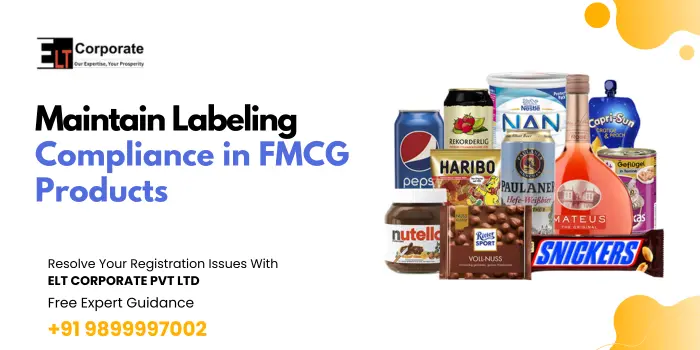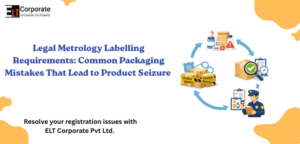Labeling compliance in FMCG products is one of the most important requirements for companies that sell packaged goods in India. Fast-Moving Consumer Goods (FMCG) like food, beverages, toiletries, cosmetics, and household items reach millions of consumers daily. To make sure that these products are safe, genuine, and correctly represented, the Indian government has set strict labeling rules.
Maintaining labeling compliance in FMCG products not only helps businesses avoid legal penalties and product recalls, but also builds consumer trust and ensures fair trade practices.
What does labeling compliance in FMCG products mean?
Labeling compliance in FMCG products means following all the legal and regulatory rules for the information printed on product labels. It ensures that every package carries the correct and complete details about the product.
- Labels must show accurate information about weight, price, expiry date, ingredients, and manufacturer.
- They must not mislead consumers with false claims.
- They must follow the rules set under Legal Metrology (Packaged Commodities) Rules, 2011 and FSSAI regulations.
In short, labeling compliance in FMCG products is about transparency and legality in packaging and labeling.
Why is labeling compliance in FMCG products important for businesses and consumers?
Labeling compliance in FMCG products is important because:
- For Consumers: It protects them from being cheated and gives them reliable information before purchase.
- For Businesses: It avoids fines, improves brand image, and ensures products can be sold across India without restrictions.
- For Market Regulation: It ensures fair competition and prevents misleading advertising.
Example: If a protein powder shows the wrong weight or fake nutrition details, it can harm consumer health and cause strict penalties for the company.
Which authorities regulate labeling compliance in FMCG products in India?
Several government bodies regulate labeling compliance in FMCG products:
- Legal Metrology Department – Ensures correct declarations like weight, price, MRP, and quantity.
- FSSAI (Food Safety and Standards Authority of India) – Ensures food products have correct nutritional, allergen, and safety labeling.
- BIS (Bureau of Indian Standards) – Ensures standards for certain products like bottled water, milk powder, etc.
- Drug Controller (for cosmetics & personal care products) – Monitors ingredients and claims.
What are the mandatory details required on labels to maintain labeling compliance in FMCG products?
To maintain labeling compliance in FMCG products, every package must have:
- Name of the product.
- Net quantity (weight/volume).
- Maximum Retail Price (MRP).
- Manufacturing date and expiry date.
- Manufacturer’s name and address.
- Batch or lot number.
- Ingredients list (in descending order).
- Nutritional information (for food products).
- FSSAI license number (for food products).
- Customer care details.
- Country of origin (for imported products).
How do Legal Metrology rules affect labeling compliance in FMCG products?
Legal Metrology rules directly control labeling compliance in FMCG products because they make sure that all products declare correct information about weight, price, and measurement.
- Every packaged product must have standard units (grams, liters, etc.).
- Price and quantity must be clearly written.
- No misleading packaging is allowed.
- Violations can lead to penalties, seizure of goods, and cancellation of licenses.
Example: If a soap bar says 150g but actually weighs 140g, it is a violation under Legal Metrology rules.
How does FSSAI regulation impact labeling compliance in FMCG products?
FSSAI plays a big role in labeling compliance in FMCG products, especially for food and beverages.
- Nutritional information (calories, protein, fat, sugar, etc.) must be displayed.
- Allergen details (like nuts, soy, gluten, milk) must be highlighted.
- Expiry date and “best before” must be clear.
- No false health claims are allowed (e.g., “Cures diabetes” if not scientifically proven).
- FSSAI license number must be printed.
This ensures consumer safety and correct dietary information.
What are the common mistakes companies make in labeling compliance for FMCG products?
Some common mistakes in labeling compliance in FMCG products include:
- Missing manufacturing or expiry date.
- Printing MRP incorrectly.
- Wrong product classification (food vs. cosmetic).
- Using foreign language without proper translation.
- No FSSAI license number on food products.
- False claims like “100% organic” without certification.
- Wrong or incomplete ingredient list.
What are the penalties for non-compliance with labeling rules in FMCG products?
Penalties for non-compliance with labeling compliance in FMCG products can be heavy:
- Fines: From ₹25,000 to several lakhs depending on the violation.
- Product Seizure: Products may be removed from the market.
- License Cancellation: Manufacturer or importer license may be suspended.
- Legal Action: In case of repeated violations or consumer harm.
Example: Selling food without FSSAI labeling can result in a fine of up to ₹10 lakhs and imprisonment in extreme cases.
How can businesses maintain proper labeling compliance in FMCG products?
Businesses can follow these steps to maintain labeling compliance in FMCG products:
- Understand regulations – Stay updated with Legal Metrology and FSSAI rules.
- Use checklists before printing labels.
- Hire compliance experts or consultants.
- Train staff to avoid labeling errors.
- Conduct internal audits regularly.
- Use the right packaging material to ensure clear, readable labels.
Why is professional consultancy important for ensuring labeling compliance in FMCG products?
Professional consultancy helps businesses in:
- Understanding complex Legal Metrology & FSSAI rules.
- Preparing correct label designs before product launch.
- Avoiding penalties and product recalls.
- Faster approval of products in the market.
- Saving time and money by reducing errors.
For companies, having expert consultants ensures smooth business operations without compliance risks.
What is the most important rule in labeling compliance for FMCG products?
The most important rule is to provide complete and correct information like weight, price, expiry date, and FSSAI license number.
Can wrong labeling stop FMCG products from being sold?
Yes, if labeling compliance in FMCG products is not followed, products can be seized or banned from sale.








